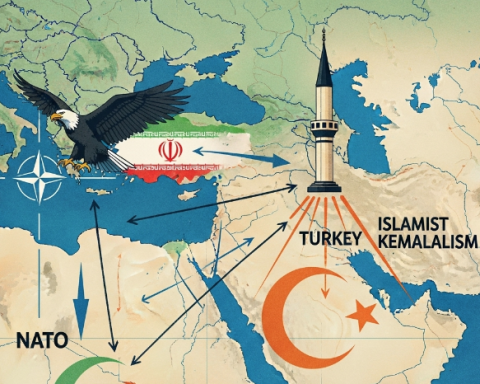Since 2018, General Abbas Kamel had been the head of the General Intelligence Service (GIS), but he has now been replaced by Hasan Mahmoud Rashad. Egypt’s new intelligence chief, Major General Hasan Mahmoud Rashad, took office on October 16, 2024, after being sworn in before Egyptian President Abdel Fattah el-Sisi in Cairo.
The GIS is a state institution responsible for both domestic and foreign intelligence in Egypt, and its director reports directly to the President. The former head, Kamel, has not been completely sidelined.
According to Egypt’s official news agency MENA, President Abdel Fattah el-Sisi issued a decree appointing the current intelligence chief, Abbas Kamel, as a presidential advisor, the general coordinator of security units, and a special envoy of the presidency.
In this context, Kamel’s new role will involve advising the president and acting as a special representative, while also coordinating security agencies. In simpler terms, Abbas Kamel has been appointed as the President’s Advisor and General Coordinator of Security Units.
Who is Hasan Mahmoud Rashad, the newly appointed head of Egypt’s General Intelligence Service (GIS)?
He is one of the rare intelligence officers who has managed to keep himself out of the public eye. Therefore, there is not much information about him in the archives of either his own country or global media. The details I am about to share come from my own special sources.
Hasan Mahmoud Rashad was born in Cairo in 1967. He is married and has children. He is 1.70 meters tall and speaks both Arabic and English. Judging by the arrangement of his first and last names, it can be speculated that his family might have Turkish origins or may have been high-ranking administrators during Turkish rule.
Surname Analysis:
The name “Rashad” means someone who has reached maturity, is discerning, has attained wisdom, and found the right path. The root word “Rashad” also means enlightenment and coming of age, with a derivative meaning of awakening to the right way. Words such as “Irshad,” “Murshid,” “Rashid,” and “Rushed” are similarly related, carrying meanings of guidance, leader, and maturity, and have been incorporated into the Turkish language.
There is a rumor that, judging by his surname, he might belong to the famous Ibn Rashid family, with some members still living in Syria, and that he is likely part of the Shammar tribe, known for being rivals of the Sharif Hussein and Al Saud families.
This tribe is one of the largest in the Arabian Peninsula, spreading across Qatar, Saudi Arabia, Kuwait, and Iraq. During World War I, it remained allied with the Ottoman Empire until the very end. The Shammar tribe, which has a population of five million, is a key player in the regional power struggle centered on Saudi Arabia. The tribe stretches from Saudi Arabia, Iraq, and Kuwait to the shores of the Mediterranean. Some members of the tribe have also settled in Egypt.
One of his close relatives, Prof. Hoda Rashad, is the Director of the Social Research Center at the American University in Cairo. She served as a member of the Egyptian Senate between 2004 and 2011 and has held positions such as a member of the Council of Social, Human, and Population Sciences, the Egyptian Academy of Scientific Research and Technology, and the National Council for Women. Prof. Rashad is also a member of the WHO’s EMRO Commission on Social Determinants of Health.
A Graduate of Cairo Military Technical College
Rashad, the newly appointed head of the Egyptian Intelligence Service (GIS), completed his primary, secondary, and high school education before enrolling at Cairo’s Military Technical College, a traditional training ground for intelligence leaders, at the age of 18 in 1985. He graduated with high distinction in 1990 at the age of 23.
This school, founded in 1957, is regarded as one of the most distinguished scientific research centers of the Armed Forces. The Military Technical College specializes in military sciences and technology.
Rise in the Intelligence Bureaucracy
After graduating from the Military Technical College, which trains engineers for the army, Rashad was assigned to Egypt’s General Intelligence Service. As part of his internal training within the agency, he took specialized courses on intelligence operations as well as regional and global security issues.
It is said that some of his academic articles were published under a pseudonym, but I couldn’t find them. If I had, I could provide more insight into his intellectual caliber. Although his field experience is reportedly limited, he is known for his efficiency and work ethic, which enabled him to quickly rise in administrative positions. He often held leadership roles within the intelligence agency. Despite staying in the background, his rapid promotion to significant roles in the General Intelligence Service has drawn attention.
Why Did Egypt Replace Its Intelligence Chief?
Sisi’s decision to remove Abbas Kamel as head of the GIS came just a few months after a major cabinet reshuffle in July, which changed the structure of at least 20 ministries in the midst of worsening economic and political crises.
One of the most detailed and intriguing assessments of this change appeared in The Wall Street Journal. The newspaper’s headline, “Egypt Replaces Spy Chief Trusted by U.S., Israel, and Hamas,” suggests that this move was not routine.
It is likely that the Egyptian government is unhappy with the U.S. Navy’s proximity to its shores in the Mediterranean and the military support given to Israel. What I don’t understand is why the U.S., Hamas, and Israel are being lumped together. Could it be that Egyptian state intelligence believes these three entities are working in unison?
Abbas Kamel helped negotiate a week-long ceasefire between Israel and Hamas last year and was working toward a longer-term agreement. He played the role of Egypt’s main mediator in negotiations between Israel and Hamas.
This leadership change in Egypt’s intelligence service comes at a time when the country is surrounded by regional conflicts, which is concerning. Do the successors of Khedive Muhammad Ali Pasha not know that you shouldn’t change horses midstream?
Looking at the situation, two possibilities arise. Either the new chief is anti-U.S./Israel, or he is more pro-U.S./Israel than his predecessor. However, The Wall Street Journal’s headline implies that the opposite might be true.
Some foreign policy experts believe that Abbas Kamel’s removal could be linked to his failure over the past year to secure a ceasefire and a prisoner exchange agreement with Israel and Hamas, as well as with Qatar and the U.S. They point out that the conflict has now also spread to Lebanon. However, Kamel was involved in these negotiations alongside his deputy, Hasan Mahmoud Rashad.
As Kamel’s deputy, Rashad was part of the team negotiating important issues, including the normalization of relations between Egypt and Iran.
Major General Hasan Mahmoud Rashad is a seasoned intelligence bureaucrat with experience in handling foreign policy issues, including conflicts in Gaza, Sudan, and Libya, as well as operations against long-standing political dissidents.
There may be several possible reasons behind Rashad’s appointment as the new head of the GIS. These kinds of leadership changes are often tied to the country’s security policies, intelligence needs, and the current political situation.
Additionally, the appointment of a new chief could be linked to the need for changes in general intelligence strategies, internal innovations, or evaluations of the previous leader’s performance.
If this change is related to a recent event, such as security threats or shifts in international relations, it could also be seen as the reason for Rashad’s appointment.
In the end, the new role given to Abbas Kamel by President Sisi reflects an effort to benefit from the former intelligence chief’s expertise and skills in an important new position.
One more point to consider is the increasing use of artificial intelligence and other modern technologies by Israeli intelligence services in their actions against Hamas and Hezbollah militants, particularly in their covert operations. It is possible that the failure of Egyptian intelligence services to keep up with these new-generation terrorist tools in asymmetric and hybrid warfare played a role in this leadership change.
That’s the way it is!
Published in Turkish on the KonuYorum website









